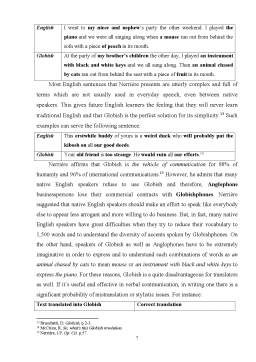Cuprins
- I. INTRODUCTION 2
- II. GLOBISH: MEANING, ORIGINS AND GOALS 3
- III. GLOBISH FEATURES AND IMPACT 5
- IV. CRITICS AND CONCLUSIONS 8
- V. GLOSSARY 9
- VI. BIBLIOGRAPHY 11
Extras din referat
I. INTRODUCTION
The world is continuously changing due to globalization, which influenced various domains of the human activity. Communication is one of the first fields influenced by globalization because language it’s the basic tool in the establishiment and maintenance of the relationships among people. As a lingua franca, English is the language of international communication and because the number of the non-native English speakers is bigger for several times than that of native speakers , English language became one of the main targets of changing, that influenced the way in which it is used. So, it occurred the necessity of a kind of English which can be learnt quickly and used very easily for an effective communication. A solution to these claims was brought by Jean-Paul Nerrière, a French computer engineer and ex-vice president of International Business Machines (IBM) in the United States, who proposed an extremely simplified form of English, called Globish.
The goal of this report is to introduce in Globish phenomenon through the accomplishment of the following objectives, namely:
- To present Globish features;
- To evaluate Globish impact;
- To present experts’ points of view about Globish.
In order to achieve these objectives, I consulted Jean-Paul Narrière’s publication Globish The World Over, (co-author with David Hon) and his article Do you speak English or Globish?. Also, I read many specialized works of native and non-native English experts, such as: Can Globish be the Language of the World? Examining the Effectiveness of Using Highly Simplified English in International Education by Kristine Newton, Global English (Globish) and Its Impact on the Translator by Jeana M. Clark and Esma A. Gregor, Globish in Europe by Bradean-Ebinger Nelu and Lőrincz Jînos Andrîs, Parlez Globish: English language in a globalized world by Maria Yvonne Băncilă and others. This diversity of publications proves the wide concern of specialists about this topic and obviously its actuality.
II. GLOBISH: MEANING, ORIGINS AND GOALS
Globish is an extremely simplified and reduced version of English, that is used around the world. The name of Globish is a composition of two words global and English, what means that this form of English was created to become the language of the world , a new lingua franca. According to Jean-Paul Nerrière and David Hon, Globish is not “English for the World”, or even “Simple English”, it is a special kind of English, a common ground and it is no longer native speakers English. Nerrière believes that the future of English belongs to non-native speakers and he called this English form Globish in order to reflect the fact that English is not owned by its native speakers anymore .
Even if Globish is related to Jean-Paul Nerrière and it is considered that the term Globish was coined by him in 1995 , Globish appeared due to Madhukar Gogate, an Indian structural engineer, in the late 90s of the XX century. Gogate attempted to simplify English and presented his language version to the Simplified Spelling Society (now known as English Spelling Society) of Great Britain in 1998. Madhukar Gogate asserted that his project is related to, but independent from, English. He created Globish as an artificial English dialect in order to simplify the orthography and pronunciation of the standard English. For example, the word colour/color is in Gogate’s Globish kalar. Therefore, Globish created by Madhukar Gogate is considered to be an artificial language, that keeps the standard English pronunciation, but is characterized by huge orthographic and punctuation differences (look at the table below ).
Bibliografie
1. Băncilă, M. Y., Parlez Globish: English language in a globalized world, (http://www.diacronia.ro/ro/indexing/details/A5484/pdf), Universitatea din Pitești, 2006, 7 pages.
2. Bruschetti, D., Globish (https://ru.scribd.com/document/291984535/Globish),
7 pages.
3. Castillo, M., Globish and the Empire, article from American Journal of Neuroradiology, vol. 32, no. 8, September 2011.
4. Clark, J. M. and Gregor, E. A., Global English (Globish) and Its Impact on the Translator, article from ATA Cronicle, (November/December 2012).
5. Lőrincz, J. A. and Bradean-Ebinger, N., Globish in Europe, 62 pages, (http://www.grotius.hu/doc/pub/YCBPHV/globish%20in%20europe.pdf).
6. Matei, T. and Șaganean, G., Syntheses in Sociolinguistics, Pontos, Chișinău, 2013, 130 pages.
7. McCrum, R., So, what's this Globish revolution, 2006 (https://www.theguardian.com/theobserver/2006/dec/03/features.review37)
8. Nerrière, J.P., Do you speak English or Globish?, article from Gérer et comprendre, June 2010.
9. Nerrière, J.P. and Hon, D., Globish: The World Over, International Globish Institute, 2009, 182 pages.
10. Newton, K., Can Globish be the Language of the World? Examining the Effectiveness of Using Highly Simplified English in International Education, article from Literacy Information and Computer Education Journal (LICEJ), Volume 4, Issue 3, September 2013.
11. Redston, C. and Cunningham G., face2face Upper-intermediate Student’s book, second edition, Cambridge University Press, Cambridge, 176 pages.
12. https://en.wikipedia.org/wiki/Globish_(Gogate) (accessed on 31.03.2018)
13. http://www.globish.com/ (accessed on 13.04.2018)
Preview document
Conținut arhivă zip
- Globish.docx


















